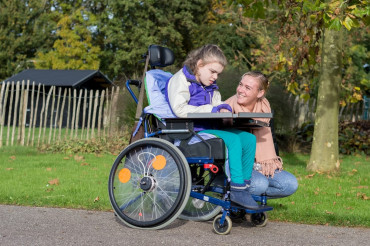How Does Cerebral Palsy Affect Language Development And Speech?

Cerebral palsy is a permanent, non-progressive medical condition that happens when an unborn or newborn baby suffers an injury to their developing brain. The condition affects the child’s ability to control body movements, and it can cause involuntary movement, muscle stiffness, weakness, or shakiness. It can also cause developmental disabilities and problems with balance and coordination. The severity of cerebral palsy (CP) symptoms ranges from mild to debilitating, and they vary from child to child.
Because motor, sensory, and intellectual impairments are associated with cerebral palsy, speech problems and language development issues are common. Cerebral palsy frequently involves the language center of the brain that controls speech. In milder cases of CP, the child may have challenges using the right words, while in more severe cases, the child’s ability to express themselves may be significantly impaired.
How Does Cerebral Palsy Affect Speech?
Speaking involves using a complex combination of muscles in the face, throat, neck, and other body parts. CP often causes oral functioning problems and affects the area of the brain that controls speech. People with CP may struggle to find the correct words or form coherent sentences to express themselves. In later life, this can make social interactions very difficult.
The most common types of speech disorders associated with CP include:
- Voice disorders – Volume control, voice quality, and irregular pitch make it very difficult for children with CP to interact with others.
- Fluency disorders – Stuttering and interruptions in speech often break the flow of speech.
- Articulation disorders – CP can cause weakness in the face, throat, and neck muscles and poor oral motor control. This impedes a child’s ability to form syllables and even make sounds.
- Aphasia – This disorder involves damage to the area of the brain that affects speech and language, making it hard to speak, read, write, and comprehend communication.
- Dysphasia – Dysphasia causes difficulty swallowing or digesting food, leading to drooling, coughing, gagging, and vomiting.
- Dysarthria – This condition impairs muscle movement in the lips, tongue, and vocal cords, often resulting in mumbling, slurred speech, and a delayed speech rate.
- Expressive disorders – Putting words together to relate ideas is very difficult with expressive disorders.
- Receptive challenges – These challenges include processing and understanding language, making it difficult to derive meaning from communication.
- Cognitive communication disorders – Cerebral palsy can cause difficulty with communication skills that involve memory, perception, organization, and problem-solving.
How Does Cerebral Palsy Affect Language Development?
Language development is often impaired or delayed in children with cerebral palsy. Some of the difficulties with language development include problems generating speech, facial expressions, gestures, using the voice, and understanding speech. Children with CP typically have problems with muscle control, causing weakness, spasms, slow movement, and a limited range of motion. Controlling the fine motor skills needed to produce speech is challenging for people with CP.
Language development may be delayed or impaired by:
- Motor control issues
- Cognitive deficits
- Diminished sensation perception
- Language acquisition problems
The difficulties of CP are not reversible, but their progression can be slowed with early intervention. A speech and language assessment should be performed by a speech pathologist as soon as possible after CP is diagnosed to start speech therapy. Speech therapy allows children with CP to communicate more effectively with their parents, and it can lay the foundation for being successful in school and later in life.
Is Cerebral Palsy Preventable?
Cerebral palsy can be debilitating for the child and devastating for their families. To make matters worse, the condition is often preventable and occurs due to medical malpractice or negligence. If a medical professional has acted negligently and your child subsequently received a cerebral palsy diagnosis, you may be able to seek compensation in a birth injury lawsuit.
At Ross Feller Casey, we understand that having a child with cerebral palsy can change the lives of everyone in the household. It is often challenging for parents, siblings, and other family members to deal with.
One of the struggles for many parents of children with CP is the volume of medical expenses involved in raising a child with cerebral palsy. That’s why we are dedicated to helping families like yours. While money cannot change the outcome of CP, it can help ease financial burdens and take at least one thing off your plate.
Contact an experienced cerebral palsy attorney at Ross Feller Casey in Philadelphia to discuss your case. Our consultations are free, and we work cases on a contingency basis, so you don’t pay a cent until we win or settle your case. So, don’t delay contacting Ross Feller Casey.
Disclaimer: Ross Feller Casey, LLP provides legal advice only after an attorney-client relationship is formed. Our website is an introduction to the firm and does not create a relationship between our attorneys and clients. An attorney-client relationship is formed only after a written agreement is signed by the client and the firm. Because every case is unique, the description of awards and summary of cases successfully handled are not intended to imply or guarantee that same success in other cases. Ross Feller Casey, LLP represents catastrophically injured persons and their families in injury and wrongful death cases, providing legal representation in Pennsylvania and New Jersey.





